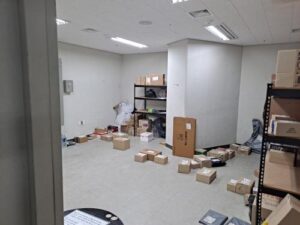Every now and then, we come across codes or alphanumeric strings that seem a little mysterious. One of those is 4a58637154zw. At first glance, it looks like a random sequence of letters and numbers, something pulled out of thin air with no real meaning. But as with many codes, strings, and identifiers, there’s usually a story behind them. Whether it’s tied to technology, security, or simply a unique tag created for tracking purposes, strings like 4a58637154zw serve a purpose.
In this article, we’ll explore what such a code might represent, why unique identifiers like this exist, and how they fit into the bigger picture of our digital and everyday lives. While it may look confusing, understanding the role of identifiers such as 4a58637154zw is easier than it seems.
What is 4a58637154zw?
At its core, 4a58637154zw is an alphanumeric code. This means it combines numbers and letters to create a sequence that is both unique and difficult to guess. Alphanumeric strings like this are often used in areas like database management, digital encryption, software keys, and online security.
Instead of relying on plain words, systems generate strings like 4a58637154zw because they are not easily predictable. They add a layer of uniqueness that ensures one code isn’t confused with another. For example, if you were assigned a code like “12345,” it would be easy to duplicate or misplace. But a more complex sequence like 4a58637154zw drastically reduces the chance of error or overlap.
Why Do We Need Codes Like 4a58637154zw?
You may be wondering—why not just use names, words, or short numbers instead of something this complicated? The reason is tied to both security and efficiency.
- Uniqueness – A random string ensures no two identifiers are the same. This makes it perfect for tracking, labeling, or assigning ownership.
- Security – Sequences like 4a58637154zw are harder to crack compared to simple passwords or serial numbers. They offer better protection in digital environments.
- Scalability – When systems deal with millions of users or entries, short numbers and words run out quickly. Complex codes allow for nearly unlimited unique possibilities.
- Global Application – A code doesn’t rely on language or culture. While words can mean different things across languages, an alphanumeric code is universally understood as a neutral identifier.
Real-Life Scenarios Where You Might See 4a58637154zw
Although 4a58637154zw may look abstract, there are plenty of real-life areas where such codes are common.
- Product Serial Numbers: Many gadgets and electronics carry alphanumeric identifiers just like this one. It’s how manufacturers track warranty claims, authenticity, and batch details.
- Database Entries: In large systems like healthcare or banking, customers or records often have unique IDs. These help prevent mix-ups and ensure privacy.
- Software Keys: Activation codes for digital products often look like 4a58637154zw, ensuring each user has a legitimate copy.
- Shipping and Logistics: Packages often come with tracking codes made of similar strings so that no two parcels are confused.
- Security Tokens: For authentication, websites and apps often generate temporary strings for verification purposes.
In each of these cases, a code like 4a58637154zw is more than just a jumble of letters—it’s a practical solution.
The Psychology of Random Codes
At first glance, random codes can feel intimidating. They look messy and meaningless, and it’s easy to dismiss them as “computer language.” But in reality, they are designed to strip away subjectivity. Unlike names or labels that can be biased, misunderstood, or duplicated, a string like 4a58637154zw doesn’t carry emotional weight. It’s neutral, efficient, and universal.
Interestingly, humans have learned to associate these random strings with trust and reliability. For instance, when you buy an electronic device and see a long serial number like 4a58637154zw, you immediately think: “This is official and unique.” That trust is built because we know the code can’t easily be copied or faked.
Could 4a58637154zw Have Hidden Meaning?
Sometimes, strings like 4a58637154zw aren’t random at all. They may carry hidden meaning within their structure. For instance:
- The numbers might represent a date or a batch number.
- The letters could be shorthand for a product line or system category.
- The ending, “zw,” might point to a region, country code, or internal classification.
Even though to us it looks like random noise, for the system or organization that created it, 4a58637154zw might tell a full story. It could say when something was made, where it came from, and even what version it belongs to—all without revealing that information directly to outsiders.
Benefits of Codes Like 4a58637154zw in Daily Life
We may not notice it, but identifiers like 4a58637154zw make our daily lives smoother and more secure. Here’s why they matter:
- Organization: Imagine a library with thousands of books. Without unique identifiers, finding the right one would be chaos.
- Verification: When you buy a product online, the code ensures you’re getting the exact item you ordered.
- Authentication: Digital accounts and services use random identifiers to confirm who you are.
- Tracking: Packages, products, and even medical records can be monitored safely without confusion.
Without such codes, mistakes, fraud, and inefficiency would rise dramatically.
How to Think About 4a58637154zw
Instead of seeing it as a random string of nonsense, think of 4a58637154zw as a key. Just like a physical key fits into one specific lock, this code serves a very precise role in a larger system. It may connect to a product, a file, a service, or a process—but whatever it’s tied to, it’s the only one of its kind.
This perspective makes it easier to appreciate the value of identifiers. They may not be pretty or easy to remember, but they are powerful in how they keep the modern world organized and functioning.
The Future of Identifiers Like 4a58637154zw
As our digital and connected world grows, we’ll see even more reliance on complex identifiers. Think about it—more users, more devices, more data. To keep it all organized, systems will continue generating unique strings like 4a58637154zw.
With the rise of blockchain, artificial intelligence, and global e-commerce, identifiers will become more critical than ever. They’ll not only track goods but also verify digital ownership, protect identities, and support secure transactions.
Final Thoughts
At first glance, 4a58637154zw might look meaningless—a confusing combination of letters and numbers that seems impossible to remember. But beneath the surface, it represents an important concept: uniqueness, security, and organization in a world that depends on precision.
From product tracking to online safety, codes like this one play a role in nearly every corner of modern life. And while we may never know the exact story behind 4a58637154zw, we can appreciate how identifiers like it make the systems we rely on every day work smoothly.











